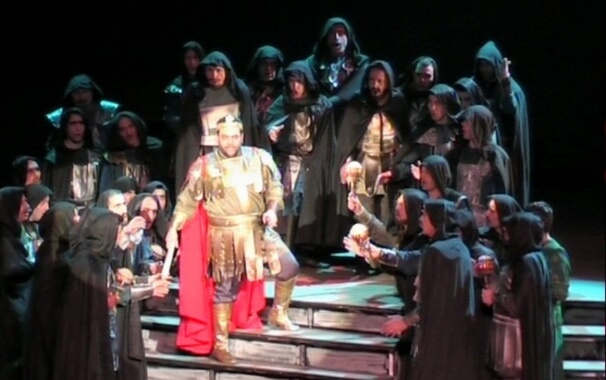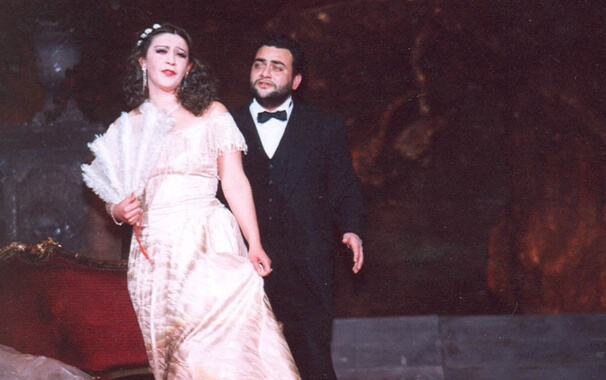My Way Home
28.10.2024
Repat Story
Happy Back Home: Opera Singer Suren Mkyan's Repatriation to Armenia
-webp(85)-o(jpg).webp?token=bb7cd001c7cbb3501df19de674386a51)
Suren’s Artistic Path and Repatriation
In March 2024, the Armenian National Opera and Ballet Theatre staged the world and Armenian premiere of Arshak II, the first Armenian opera composed by Tigran Chukhadjian. After a long career spanning Italy and the United States, where Suren Mkyan (Mkrtchyan) took on leading roles in international opera productions – including a world premiere of Chukhadjian's Zemire – Suren repatriated to Armenia to perform his own part in bringing Chukhadjian's works to the stage here.
“I began my journey in 1999 as a student at the Yerevan Conservatory. At that point, I became a soloist at the Opera and Ballet Theatre and performed across the former Soviet Union and Europe. In 2007, I got an offer from Italy to retrain at the Rossini Academy in Pesaro. A year later, I was invited to the U.S. for the world premiere of Zemire in Pasadena. I then joined the San Diego Opera, one of the top opera companies in the U.S. It was a fantastic experience, performing various roles and working with world-class orchestras and conductors,” shares Suren.

“For me, 2020 was a turning point. When COVID hit, we musicians had no work and I lost someone very close to me and couldn’t travel back to Armenia. That loss made me question: was it right for me to be abroad? Then the war broke out, and it really hit me that it was time to come home. The decision wasn’t easy, but I felt my country needed me more than the U.S. did. I’m at an age where I can teach, and it felt right to pass on my knowledge to the next generation here in Armenia. The lockdown forced me into deep self-reflection. I found myself asking, ‘Is this truly how things should be?’ What if the borders don’t open? What if I get stuck on this island? But the problem isn’t with the island; the problem is that returning to your roots feels more right. Of course, there are specialists in Armenia too, but most people are thinking about leaving the country. And what will happen to our country then? That’s when I realized: I don’t want to live away from home anymore. My place is here, in my homeland,” he says.
Repatriation: A Year Later
Suren had made the decision to return by 2021, but it became final in 2023 when his longtime friend, Karen Durgaryan, now the director of the Armenian National Opera and Ballet Theatre, invited him to work together.
A year after his return, Suren is a soloist with the Armenian National Opera and Ballet Theatre. He also teaches at the Tchaikovsky Music School, where he heads the vocal department, and at the Aznavour Yerevan State College of Culture and Arts. He has been recognized with numerous international awards.
In an interesting twist, Suren’s repatriation is what brought his Armenian student back from the U.S. Mariam followed her teacher, got married, had a child and is now getting ready for concerts.
Facing Challenges in Education
Suren admits there are challenges in coming back home, especially with how things work here. “Abroad, there’s no hierarchy – everyone is treated equally. But here, there’s always this tension. The education system is struggling, but it’s hard to blame anyone directly.
“The government needs to set a living wage for teachers, so we can ensure quality education. After a year here, I’ve realized that professional certification is crucial. Many people are teaching without the proper qualifications, and that’s affecting both teaching and learning”, Suren believes.
“Each student needs an individual approach. You can’t just gather everyone and teach them singing – it's not a choir. No one talks about this here. Teachers get paid next to nothing for their work. They take on more students to make ends meet. But with that many, you can't deliver quality. Does the government ask itself this question? I came back from abroad with my own ideas, and I manage to make a living. I can afford to take a small number of students and guide them from point A to point B, but I’m the only one doing that. This is a serious and deep issue that the government needs to address," he admits.
Suren believes in improving the system. “Armenia has talented musicians who could help create a professional certification process. I’d even put myself forward for it. If we don’t act soon, we risk losing our entire education system.”
"I have wonderful kids, and I see the results. I'm happy. It’s the most rewarding thing I can get. I guide each child or student along a specific path, and this method works. We don’t want to send our next generation off to other countries. We need to work to make sure they stay in Armenia. Today, we have many great performers working in the best theaters around the world, and of course, their fees are beyond what you can imagine. We need to create conditions where specialists, despite the fee differences, come here and teach the new generation," says Suren.
He admits that friends have suggested he open an academy here, but he believes changes need to happen in the public sector. The issue is with general education, and it's a problem in all educational institutions. It’s one of the country’s weakest links.
"Many people already have a slave mentality. Some actually like it. When you start talking, they look at you like you just landed from the moon. They say, 'Well, you came from abroad, you can do that.' Am I any better than you? You need to free yourself from everything in your head. The day people can see that freedom in their minds will be the start of change. I might be speaking from some high point here. We’ve spent thirty years getting to where we are today. It’s useless to talk about it too much; we need to do everything we can to restore what we had. For me, the most important thing is education. Education is the driving force behind everything. An illiterate person is of no use to anyone. The world is moving so fast now, competition is huge, and you have to be ready for it. I’m an engineer by first profession, but I’ve never worked in that field. Still, it gave me knowledge in a wide range of areas, and my worldview is different," admits Suren.
Happy Back Home

From all he shared, one might think Suren feels unsettled in Armenia. However, throughout our interview, I saw a joyful man who genuinely loves being home, calling it his greatest joy.
“I’m really happy to be back. When I teach, and I see a child’s eyes light up with understanding, that’s what makes me happy. Every day, I thank God that I’m home.”
For Suren, Armenia’s greatest treasure is its people. “People should come back, bring their art and knowledge, and teach the younger generation. If you teach one child today, tomorrow they’ll teach five more. That’s the kind of progress that’s a form of gratitude you won’t hear anyone talk about. And no one’s going to call you; you’ve got to make that decision for yourself, through self-reflection”.
“We tend to blame everyone else. But we need to change from the inside out. Everyone should ask themselves, ‘What can I change in my surroundings?’ We need to build up this country. My mission is to share my knowledge with the younger generation. That’s when I’ll be truly happy. I already am happy. There’s no place in the world where it’s safe to live anymore. People have created illusions for themselves and live in them. It’s better to live in your own country, to create in your own country and to be complete in your own country,” Suren believes.
In December, Suren will perform in Othello by Giuseppe Verdi at the Armenian National Opera and Ballet Theatre, marking another exciting chapter in his homecoming.
By Nare Bejanyan

-webp(85)-o(jpg).webp?token=1b657244ba7067d9e8e31e9012e4f0e3)
-webp(85)-o(jpg).webp?token=660f4d541ccd8aef0cd922bfd09dd6bc)
-webp(85)-o(jpg).webp?token=11a5bd6b8d18f0ff2421ee4996d6edd4)
-webp(85)-o(jpg).webp?token=3810c852414e98bd6dea5d3a76cf94b0)